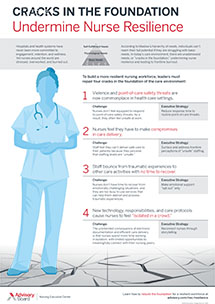Auto logout in seconds.
Continue LogoutWashington Sen. Mary Walsh has apologized for her comments that nurses at smaller rural hospitals "probably play cards for a considerable amount of the day," in today's bite-sized hospital and health industry news from California, Connecticut, and Texas.
- Connecticut: Yale University School of Medicine has been granted $5 million from the Patient-Centered Outcomes Research Institute to research telemedicine strategies for providers treating pregnant women with opioid misuse disorders. The research will include 12 obstetrical centers and 480 participants (Drees, Becker's Hospital Review, 4/22).
- Texas: MD Anderson Cancer Center announced it has removed three scientists after receiving emails from NIH describing conflicts of interest or unreported foreign income by five faculty members. According to MD Anderson President Peter Pisters, federal authorities said these scientists were involved in Chinese efforts to steal American scientific research (Ackerman, Houston Chronicle, 4/19; AP/Modern Healthcare, 4/22).
- Washington: State Sen. Maureen Walsh (R) will shadow a 12-hour nursing shift following backlash over comments she made last week about nurses' workload. During discussion about legislation to require uninterrupted breaks for nurses, Walsh on the state Senate's floor said nurses at smaller rural hospitals "probably play cards for a considerable amount of the day." In response to the comments, Chicago nurse Juliana Bindas started an online petition for Walsh to shadow a nurse on a 12-hour shift, which garnered more than 675,000 signatures in three days, according to Becker's Hospital Review. Walsh apologized for her comments and said she would gladly shadow a nurse (Gooch, Becker's Hospital Review, 4/23; Lou/Griggs, CNN, 4/23).
The 4 foundational cracks that are undermining your nurses’ resilience
Check out our infographic to learn which four cracks in the care environment leaders must repair to rebuild the foundation for a resilient workforce.
Don't miss out on the latest Advisory Board insights
Create your free account to access 1 resource, including the latest research and webinars.
Want access without creating an account?
You have 1 free members-only resource remaining this month.
1 free members-only resources remaining
1 free members-only resources remaining
You've reached your limit of free insights
Become a member to access all of Advisory Board's resources, events, and experts
Never miss out on the latest innovative health care content tailored to you.
Benefits include:
You've reached your limit of free insights
Become a member to access all of Advisory Board's resources, events, and experts
Never miss out on the latest innovative health care content tailored to you.
Benefits include:
This content is available through your Curated Research partnership with Advisory Board. Click on ‘view this resource’ to read the full piece
Email ask@advisory.com to learn more
Click on ‘Become a Member’ to learn about the benefits of a Full-Access partnership with Advisory Board
Never miss out on the latest innovative health care content tailored to you.
Benefits Include:
This is for members only. Learn more.
Click on ‘Become a Member’ to learn about the benefits of a Full-Access partnership with Advisory Board
Never miss out on the latest innovative health care content tailored to you.

